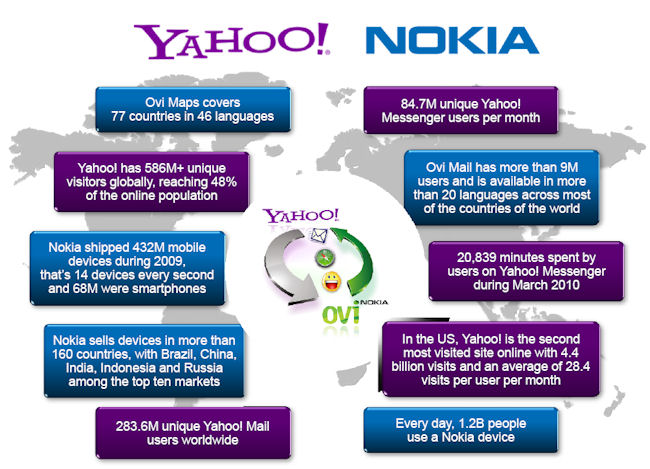Bill Ray, over at The Register, said:
"The deal makes a lot of sense. Nokia has no skill in running an email service, but the company is sitting on a lot of maps that Yahoo can use in its ongoing fight to be taken seriously as a competitor to Google. Yahoo's messaging is still extremely popular, while the fact that Ovi even had a messaging service was news to us. More importantly, Nokia and Yahoo aren't in competition with each other: something of a rarity these days. Yahoo is even a Nokia customer in that its mobile optimisation service comes from Novarra - a company recently acquired by Nokia."
Vaibhav Sharma, at The Symbian Blog, said:
"Yahoo is big in the US, infact it is the second most visited site in America and this is the userbase Nokia is looking to leverage and get better brand recognition for Ovi. Plus with Yahoo coming in, Nokia’s Ovi Mail and Chat will get better functionality without Nokia having to work on something it does not have a history with...
I think this is a very smart deal. Google already does Maps, Email and IM very well and both Nokia and Yahoo are in no position to dominate Google in all fields. Nokia does Ovi Maps very well and in my opinion they are better than Google Maps for most purposes specially in countries where there is no Google Navigation. Yahoo is perhaps the second most popular email and IM provider, after Google again. So these No. 2 ranked companies are joining resources to try and become number 1.
PS: What I would have liked even more – Ovi Share to be powered by Yahoo! Flickr anyone?"
Staska, over at Unwired View, said:
"The only part of OVI service suite that worked really well, almost from the start, was OVI Maps. About the only thing I miss, when I decide to go about with Android handset today, is the access to it. And, just like any proper web service should do, Ovi Maps is evolving pretty fast, and keeps getting better with each iteration.
The rest of the OVI? Contacts – I use them only to have another back-up, just in case. Ovi mail? Never needed one. Chat? If I could find any friends on it… Files, share, calendar – have much better ways to do these. So, today’s news that Nokia and Yahoo are combining their forces on Maps, Mail and Chat, is a great thing. Nokia must take a hard look at their OVI service offerings, pick what really works, is important, at least has a chance of succeeding, and ditch the rest. Replacing dud services, with third party offerings that already work.
Which is exactly what Nokia did, by letting Yahoo run OVI Mail and Chat. Yahoo Mail and Chat might not be as sexy as Gmail/Gtalk, but they have a huge installed user base, and, if implemented right, will help OVI adoption much more then Nokia’s own efforts in this area could. The upcoming possibility to login to Yahoo with OVI Id, is another major boon. And Nokia also gets a huge potential boost to the distribution for its Maps service. While, a very good offering on Nokia mobile handsets, OVI Maps are virtually unknown on the Web.
All in all, this deal is really good news. Of course, as long as Yahoo and Nokia do not screw it up during the implementation. Both companies are known have done that, once or twice!"
The Financial Times quoted a certain Nokia and Symbian detractor, Michael Gartenberg:
"However, analysts said the deal would fail to provide much of a boost to either company in the lucrative US and European markets. “It feels like two brands that have both lost a lot of relevance in the markets that are coming together to try to make something meaningful,” said Michael Gartenberg, an industry analyst with Altimeter. “It makes sense, but the question for both is: does it matter?” Nokia officials said the deal was aimed in part at developed markets, where critics say the group has struggled to adapt."
The Guardian also quoted Gartenberg, but also offered the following opinion:
On the surface, the tie-up seems a formidable combination. Yahoo is the web's leader in display advertising, while Nokia is the world's biggest manufacturer of mobile phones, making roughly four out of every 10 handsets globally. But both companies are under fire for being outmanoeuvred by rivals.
Nokia last month warned of weak profits as it struggles to produce a compelling smartphone to match Apple's iPhone and Research in Motion's BlackBerry. Meanwhile, Yahoo has been outflanked by Google on online search and has failed to keep up in maps, which have become a crucial element in online information.

